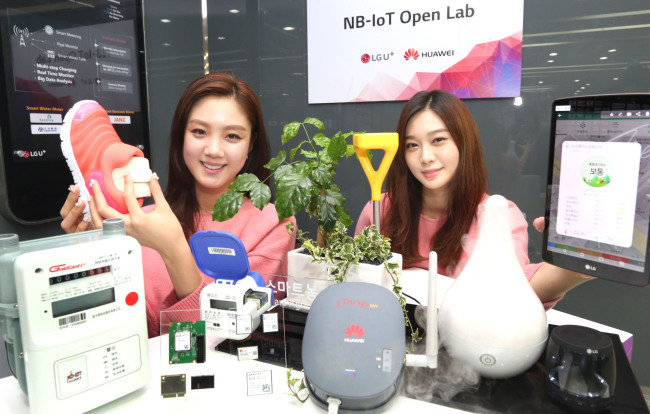South Korean mobile carrier LG Uplus has partnered with leading Chinese telecommunications equipment provider Huawei to expand the emerging markets of Internet of Things-based devices and services in Korea.
The two companies jointly opened the “NB-IoT Open Lab” at the LG Uplus Sangam Center in northwestern Seoul on Monday. The lab will become a venue for local companies to design, assemble and test run new devices connected to the Narrow-Band Internet of Things, or NB-IoT, network.
In a bid to encourage more companies to participate, Huawei said it will provide 100,000 chipsets and modules for NB-IoT devices for free at the new space. Korea is the only location among Huawei’s seven “Open Labs” worldwide to be supplied with such free IoT network supplies.
 |
Models hold up NB-IoT chipsets, modules and devices at the newly opened “NB-Iot Open Lab” established by LG Uplus and Huawei on Monday. (LG Uplus) |
“We believe that Korea’s IoT network competitiveness is the highest in the world,” head of Huawei‘s Cellular IoT product line Zhu Cheng said in explaining Huawei’s exclusive decision.
“If we can build up a successful IoT ecosystem in Korea, we believe we can succeed in other countries. We can also help Korean firms (which develop and commercialize IoT-run devices to success) venture out to global markets as well,” said the Huawei executive.
NB-IoT is a network designed to transmit small amounts of data at low speeds from sensors attached to battery-run objects to base stations across long distances. It stands as one of two major emerging IoT network formats in the world alongside LoRaWAN, which stands for “long-range wide area network.”
Low-power, cost-efficient IoT networks are geared to bring to market new technologies and services such as the off-sight monitoring of street lights, manholes and water reservoirs, as well as wearables to track down lost cattle or pets.
Through the new lab, LG Uplus and Huawei hope to offer targeted technical support to local companies which want to commercialize new devices and services running on NB-IoT networks.
Huawei’s 100,000 chipsets and modules will become officially available for use after completing the needed stabilization procedures by the end of March next year. Interested companies can apply to receive the parts starting from April, LG Uplus said.
In preparation, LG Uplus plans to start building its NB-IoT network system infrastructure in Korea starting from January next year in conjunction with KT. The two carriers will start the deployment from Seoul, with plans to cover the entire nation by the end of 2017.
Meanwhile, Korea’s biggest mobile carrier SK Telecom already deployed LoRaWAN across Korea in June in conjunction with its faster LTE-M IoT network. It has since been working with local utility and service companies to launch new IoT-run technologies and services here.
By Sohn Ji-young (
jys@heraldcorp.com)








